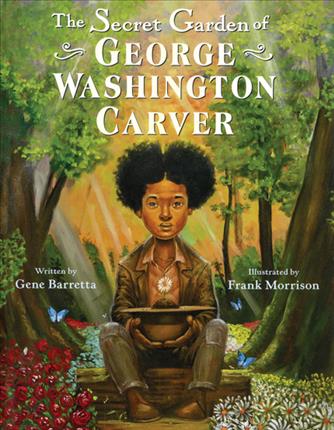| Secret garden of George Washington Carver Author: Barretta, Gene | ||
| Price: $23.78 | ||
Summary:
The inspirational story of George Washington Carver and his childhood secret garden.
| Illustrator: | Morrison, Frank |
| Accelerated Reader Information: Interest Level: LG Reading Level: 4.50 Points: .5 Quiz: 507802 |
Reviews:
Kirkus Reviews (12/01/19)
School Library Journal (+) (12/01/19)
Booklist (+) (12/01/19)
Full Text Reviews:
Booklist - 12/01/2019 *Starred Review* George Washington Carver addresses a room full of white U.S. congressmen on the value of the peanut. Though initially met with racist derision, he quickly earns their respect. The scene then shifts to his childhood. Born into slavery in 1864, Carver lost both parents before freedom came the following year. Childless, his former owners raised him and his brother as their own. Carver, who loved flowers, created a secret garden in the woods, watering his plants, talking to them, and experimenting. Eventually, he began taking in his neighbors’ sickly flowers, becoming “the plant doctor.” At twelve years old, Carver left home to pursue a good education, and he found success despite poverty and racial prejudice. Throughout his life, he worked tirelessly, experimenting, learning, and sharing his knowledge with others. In an expressive picture book that focuses on the subject’s childhood more than his later accomplishments, Barretta creates a strong impression of Carver’s delight in nature, drive to learn, and sense of purpose. The oil paintings by Morrison, a Coretta Scott King Illustrator Honor recipient, reinforce those impressions with glorious scenes of the woodland garden as well as sensitive, dignified portrayals of Carver—both the boy and the man. A biography illuminating the path, chosen in childhood, that Carver continued to follow. - Copyright 2019 Booklist.
School Library Journal - 12/01/2019 PreS-Gr 3—George Washington Carver is best known as an agricultural expert who discovered versatile uses for the peanut. This story focuses on his first garden. Hidden beneath the trees where no one could tease or belittle him, Carver studied nature and the "more he experimented, the more he learned." The narrative starts in 1921 with Carver addressing Congress on the importance of the peanut and impressing an audience of white men at a time when "African- Americans were…treated assecond-class citizens." Readers are then transported back to 1874, to the Missouri farm where Carver was born into slavery, and then to the end of slavery and the planting of his first garden. The narrative then focuses on Carver's determined search for education and finally his work as a teacher at the Tuskegee Institute. The beautiful oil on board illustrations show the wonder of young Carver as he contemplates the petals on a flower or the first green sprouts of spring. Barretta's prose, combined with Morrison's art, fully illuminates the depth of Carter's considerable contributions to the science of agriculture, the farming community, and racial equality. Back matter includes a time line of Carver's life, a bibliography, and suggestions for further reading. VERDICT A well-thought-out biography that highlights a different side of Carver and will be a first purchase for school and public library collections.—Suzanne Costner, Fairview Elementary School, Maryville, TN - Copyright 2019 Publishers Weekly, Library Journal and/or School Library Journal used with permission.



